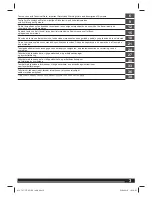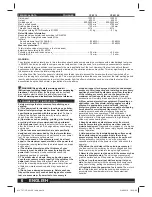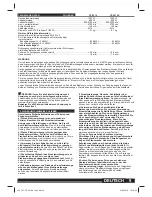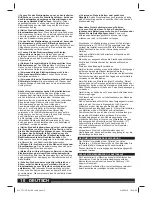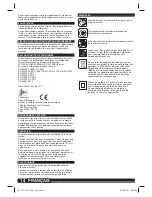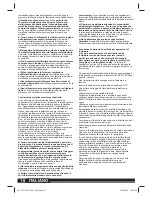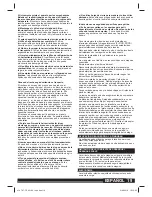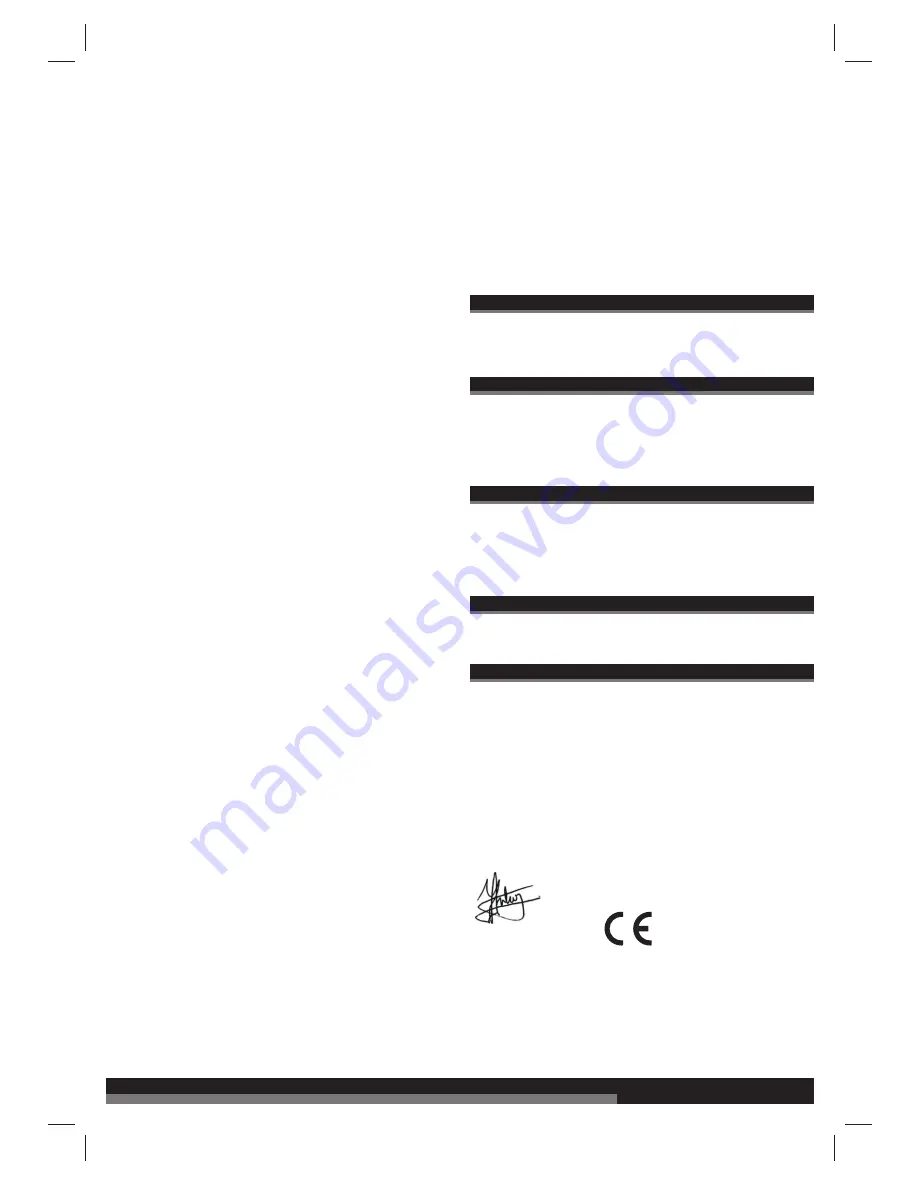
7
ENGLISH
o) Do not operate the power tool near fl ammable
materials.
Sparks could ignite these materials.
p) Do not use accessories that require liquid coolants.
Using water or other liquid coolants may result in
electrocution or shock.
Kickback and Related Warnings
Kickback is a sudden reaction to a pinched or snagged
rotating wheel, backing pad, brush or any other accessory.
Pinching or snagging causes rapid stalling of the rotating
accessory which in turn causes the uncontrolled power tool
to be forced in the direction opposite of the accessory’s
rotation at the point of the binding.
For example, if an abrasive wheel is snagged or pinched by
the workpiece, the edge of the wheel that is entering into the
pinch point can dig into the surface of the material causing
the wheel to climb out or kick out. The wheel may either
jump toward or away from the operator, depending on
direction of the wheel’s movement at the point of pinching.
Kickback is the result of power tool misuse and/or incorrect
operating procedures or conditions and can be avoided by
taking proper precautions as given below.
a) Maintain a fi rm grip on the power tool and position
your body and arm to allow you to resist kickback
forces. Always use auxiliary handle, if provided, for
maximum control over kickback or torque reaction
during start-up.
The operator can control torque reactions
or kickback forces, if proper precautions are taken.
b) Never place your hand near the rotating accessory.
Accessory may kickback over your hand.
c) Do not position your body in the area where power
tool will move if kickback occurs.
Kickback will propel the
tool in direction opposite to the wheel’s movement at the
point of snagging.
d) Use special care when working corners, sharp edges
etc. Avoid bouncing and snagging the accessory.
Corners, sharp edges or bouncing have a tendency to snag
the rotating accessory and cause loss of control or kickback.
e) Do not attach a saw chain, woodcarving blade or
toothed saw blade.
Such blades create frequent kickback
and loss of control.
Safety Warnings Specifi c for Polishing Operations:
a) Do not allow any loose portion of the polishing
bonnet or its attachment strings to spin freely.
Tuck
away or trim any loose attachment strings. Loose and
spinning attachment strings can entangle your fi ngers or
snag on the workpiece.
Appliances used at many diff erent locations including open
air should be connected via a residual current device of
30 mA or less.
Dust and splinters must not be removed while the machine
is running.
Only plug-in when machine is switched off .
Never reach into the danger area of the tool when it is
running.
Always use the auxiliary handle.
Immediately switch off the machine in case of considerable
vibrations or if other malfunctions occur. Check the machine
in order to fi nd out the cause.
Always use and store the grinding disks according to the
manufacturer's instructions.
When grinding metal, fl ying sparks are produced. Take care
that no persons are endangered. Because of the danger of
fi re, no combustible materials should be located in the
vicinity (spark fl ight zone). Do not use dust extraction.
Due care should be taken that no sparks or sanding dust
fl ying from the workpiece come into contact with you.
The adjusting nut must be tightened before starting to work
with the machine.
The workpiece must be fi xed if it is not heavy enough to be
steady. Never lead the workpiece to the grinding disk with
your hand.
Under extreme conditions (e.g. smooth-grinding metals with
the arbour and vulcanized fi bre grinding wheel), signifi cant
contamination can build up on the inside of the angle
grinder. For safety reasons, in such conditions the inside
should be cleaned thoroughly of metal deposits and a motor
circuit-breaker must be connected in series. If the motor
circuit-breaker trips the machine must be sent for repair.
For accessories intended to be fi tted with threaded hole
wheel, ensure that the thread in the wheel is long enough to
accept the spindle length.
SPECIFIED CONDITIONS OF USE
The polisher can be used for polishing lacquers, coatings,
plastics and other smooth surfaces.
Do not use this product in any other way as stated for
normal use.
STARTING CURRENT L SMOOTH START
The starting current for the machine is several times greater
than rated current. The starting current limiter reduces the
starting current to such an extent that a fuse (16 A,
slow-blow) is not tripped.
Electronic smooth start for save use prevents jerky run-up of
the machine.
ELECTRONICS
The speed of rotation is adjusted electronically when the
load increases.
In case of a longer overload period the speed is decreased
electronically. The machine continues to run slowly to cool
down the motor coil. After switching off and on the machine
can be used at rated load.
STARTUP PROTECTION
A zero-voltage switch prevents the machine from restarting
after a power failure. On resuming work, switch the machine
off and then back on again.
EC-DECLARATION OF CONFORMITY
We declare under our sole responsibility that the product
described under “Technical Data” fulfi lls all the relevant
regulations and the directives 2011/65/EU (RoHS),
2006/42/EC, 2014/30/EU and the following harmonized
standards have been used:
EN 60745-1:2009+A11:2010
EN 60745-2-3:2011+A2:2013+A11:2014+A12:2014+A13:2015
EN 55014-1:2017
EN 55014-2:2015
EN 61000-3-2:2014
EN 61000-3-3:2013
EN 50581:2012
Rock Hill SC, 2018-01-16
Yves Antier
General Manager
Authorized to compile the technical fi le.
Chicago Pneumatic Tool Company
1800 Overview Drive
Rock Hill SC, 29730
USA
414 797 - CP 8210 E.indd Abs17
414 797 - CP 8210 E.indd Abs17
31.08.2018 16:19:02
31.08.2018 16:19:02



